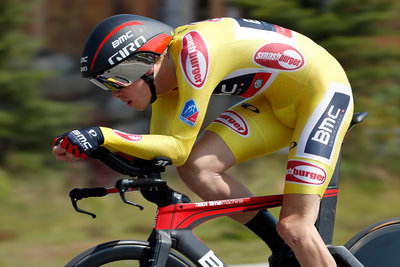
Race Radio: Time Trials Are Easy, Right? From Israel to Colorado
On paper, the Stage 5 time trial in Breckenridge looks like the easiest stage of the USA Pro Challenge. Think again: time trials are both physically painful and stratetically challenging.

Perhaps you saw the stage 5 individual time trial course in Breckenridge and thought, That looks easy! The time trial route is just 8.5 miles long, after all, and it contains only one climb.
In truth, individual time trials are often a race’s most physically demanding sections that require the most strategic planning.
During a regular road stage, riders save valuable energy by drafting off one another. In individual time trial, by contrast, drafting is forbidden. Instead, a rider must race head on into the wind.
Perhaps most challenging, a rider must expend all of his (or her) energy over the course, which means maintaining the effort even when the legs and lungs begin to burn.
“I had a teammate tell me that when you start to feel pins and needles in your body, you’re in trouble,” says Kristin Armstrong, who won the Olympic time trial in 2008 and 2012. “My goal is to not feel the pins and needles."
Because the individual time trial is a race against the clock, each rider must develop a strategy for metering out his or her effort across the route. A rider who overexerts himself too early in the course will lose time later. A rider who approaches a fast section conservatively will lose valuable seconds. One touch of the brakes on a descent costs a rider time.
The time trial course in Breckenridge started with a four-mile flat, out-and-back section. Next, the riders ascended the 800-foot stair-step climb up Moonstone Road. Finally, riders navigated a fast and twisting descent back to the finish line.
Team SmartStop’s Rob Britton has spent the last month preparing for the time trial. He has warmed up before each bike on his time trial bike, and cooled down on the bike after each finish. The efforts paid off, and Britton finished second to BMC’s Rohan Dennis.
.jpg) Britton said he rode conservatively through the course’s flat section, and kept his effort to between 5-10% below his maximum. Britton then built his effort at the base of Moonstone Road, and then maxed out his effort up the two steep ramps.
Britton said he rode conservatively through the course’s flat section, and kept his effort to between 5-10% below his maximum. Britton then built his effort at the base of Moonstone Road, and then maxed out his effort up the two steep ramps.
“I just put my head down and went, but I had to remember that the race didn’t stop at the end of the climb,” Britton said. “I had to stay on the gas for another 30 seconds into the descent before I got my recovery.”
Throughout Britton’s ride, SmartStop team director Mike Creed drove behind him, barking out time splits and course directions via a bullhorn. He urged Britton to ride aggressively on the twisting descent.
Not all riders safely navigated the downhill. Cannondale-Garmin’s Davide Formolo approached the final turn with too much speed and crashed. The incident erased Formolo’s chances at the final podium.
Stage winner Rohan Dennis, by contrast, knew he had a time advantage on the entire field by the top of Moonstone Road. Dennis rode comparatively easy on the descent.
“It was always going to be the same time from [the top] to the bottom for pretty much everyone - around four minutes,” Dennis said. “So I thought I’d at least cut it by 20 seconds if I decided to go slow down the course.”
Israel’s Cycling Academy Dreams Big
Fans lining the USA Pro Challenge course may have seen a team car handing out Israeli national flags. That car belongs to the Cycling Academy, which is a new squad to compete at the race.
Started in 2013, Cycling Academy is Israel’s first pro cycling team, and it is aimed at developing up and coming young riders. The team is comprised of riders from Israel, Poland, the Czech Republic, Slovakia and Spain.
The team is the brainchild of retired pro Ran Margaliot and Ron Baron, both from Israel. Margaliot raced for pro teams Fuji-Servetto and Saxo Bank, and when his career ended, he was determined to start a development team to funnel more Israelis to the world tour. Baron, a recreational rider and finance industry veteran, is funding the team.
Cycling Academy’s riders have, so far, struggled in Colorado’s altitude. It’s highest placed rider, Daniel Turek, sits in 60th place, 33 minutes behind Rohan Dennis. But Margaliot says the race has given his team a chance to test themselves against bigger teams.
“It’s an important experience for these guys,” Margaliot says. “They can see [the level] they need to get to.”
About the author:
Fred Dreier is a journalist living in Denver, Colorado. He has written about professional bicycle racing since 2004, and his work has appeared in a wide variety of magazines and newspapers, such as The New York Times, The Wall Street Journal and USA Today. Dreier has covered the USA Pro Cycling Challenge since its debut in 2011. He regularly rides his bicycle on many of the roads used by the race.












